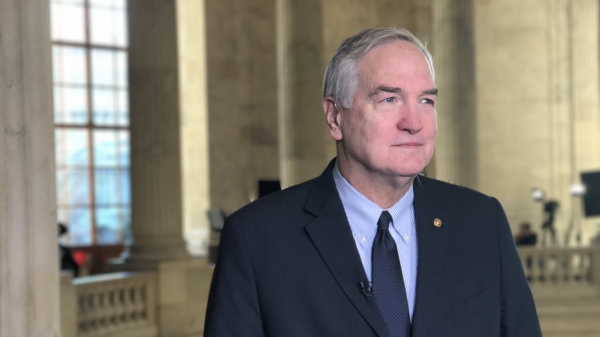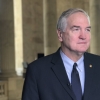By Bill Britt
Alabama Political Reporter
In part 3 we continue the conversation about Alabama’s immigration law.
APR: Something that has been bantered around lately is the unintended consequences of the immigration law. I tell people except for the Ten Commandments that were handed down from God to Moses all laws have unintended consequences.
Anything that is written by man is going to have unintended consequences and that typically has to be addressed after it is passed.
STRANGE: Actually, I have gotten a lot of calls saying, “Thank you for doing that.” Our role was to defend the law which we have done aggressively and have done extremely well. We are actually going to be studying this case and the Arizona case and we are working very hard on that.
 But then the second phase was that a lot of people were confused about the law—law enforcement and many officials. We spent a lot of time trying to give them guidance as to what it meant but we couldn’t get to that until we prepared our dissents of the law and had argued it in court and found out what was going to be upheld and what wasn’t.
But then the second phase was that a lot of people were confused about the law—law enforcement and many officials. We spent a lot of time trying to give them guidance as to what it meant but we couldn’t get to that until we prepared our dissents of the law and had argued it in court and found out what was going to be upheld and what wasn’t.
Then we moved to the guidance phase where it was asked “Are you going to change the law?” And we really have not commented on that at all until we were asked by the Majority Leader to give them our thoughts on how it could really be shored up. They just wanted to make sure.
We wanted the strongest law that could be defended. So that is what my suggestions were. And I think they appreciate that honestly. They have been quoted in the papers saying, “Look we accept changes that are suggested by the AG.” So, I said, “Are you sure you want these?” And they said, “Yeah, we do.” And it was good. We are working closely together and we have said [our office] will help them in any way. But the policy decision is theirs about what they want to do.
APR: And they are elected to make laws and you are elected to defend and prosecute the laws.
STRANGE: That’s right. And that is what is so surprising to me about the ‘New York Times’ and all. It is almost unprecedented to attack a lawyer for defending a client. I doubt if somebody came to the ‘New York Times’ (the federal government especially) and said, “We want you to send over all of your private taped recordings of somebody that had something to do with the Pentagon. Do you mind sending those over because we are in charge of enforcing all of the laws on espionage? So just send that over.” I’m sure that the ‘New York Times’ would be happy to do that.
You know, that is the scenario that says, “Attack the lawyer that says ‘I’m not sure you are entitled to that information.’” That just shows you how political this has gotten.
APR: And unfortunately it does become political rather than rational trying to seek justice and protect. Obviously, the people of Alabama are pretty much in favor of this law. How much of it they understand, I don’t know, but they do understand the fundamentals of sovereignty and while I am certainly sympathetic to any immigrant that is trying to make a living and raise a family we still have to have certain laws that govern how things work. If we don’t then we’re living in anarchy or chaos.
STRANGE: That is the problem that I have when I talk to the average person in Alabama. It is very hard to explain why one particular group (and it is not just Hispanics) it’s anybody—Japanese, German—anybody who is not a U.S. citizen. Anybody that is here has to follow the law. If a normal citizen has to follow the law then everybody does. It’s hard to say you are not going to enforce the law against one group. And people just don’t understand that and it is hard to explain. It is kind of erodes the whole rule of law which undermines the whole system that we have.
APR: Well, society breaks down without laws. The thing is and I took exception personally to the media making such a big story out of the stopping of the Mercedes and the Hyundai employee. If you or I travel in other countries and don’t have our passport or are driving around on an invalid license in those countries, we are going to have a lot more trouble than these folks have had. In Japan, they are more than happy to pull you over and they don’t have to have a reason to pull you over. There is no law that says that they can’t pull you over. I have just been walking down the street in Europe and asked for my papers.
STRANGE: It’s probably just because you look so suspicious, Bill. It could be that.
APR: No, no. Yeah, yeah, it’s just I look so anti-European, right?
Another example, Susan and I were coming back from Paris after 9/11 and the hassle we went through in the Charles de Gaulle Airport once we showed them our U.S. passports was just unbelievable. It was no doubt in my mind prejudicial because we are Americans.
STRANGE: Oh, I can imagine. I have been to Israel a couple of times and believe me you don’t want to get off the trail without your identification and passport in Israel. It will not go well.
But, yeah, there is a lot of different dynamics going on here and I have been focused on a couple of things.
One of the things I am doing is meeting with the construction industry people and others who are in need of skilled laborers. I am trying to put them together with the training and technical schools and some of the colleges so we can fill the vacancies in the job market and get Alabamians back to work.
APR: That is a very interesting idea. That is something that really needs more focus doesn’t it?
STRANGE: I have been working for some time trying to develop that because in certain demographics we have, kids who don’t get a high school degree, in that area there will be 50 percent plus unemployment. My concern is that if they are not getting in the job market they are going to get in trouble. If they get in trouble they are going to contribute to the problem with prisons and that is the last place we want them.
So, I have been working with a lot of the CEOs and other people in the construction business saying, “Look, if we can get you young people who can be trained in apprentice skills, will you guys go the extra mile to make that possible?” I think there are some opportunities there.
The other thing that I was going to mention is that I was personally offended by the churches that were making such a to-do about the immigration that it was anti-Christian.
You know, Alabama has probably the most expansive freedom of religion provision in our own constitution. And I made it very clear that nothing about this law would prevent anyone from exercising his or her religion or from being a good Samaritans and doing their charitable work, conducting services. Everything that they have been doing is totally protected.
I was interested to see the other day the lawyer for the bishops came out and said, “Well, we just see this like the 60s and we are not going to sit on the sidelines and get a letter from the Birmingham jail.” And to me that was very revealing because they are itching to see this as a re-fighting of the 1960s civil rights battles and it is just not.
APR: I couldn’t agree with you more. I certainly see that and unfortunately it strikes me more as posturing rather than trying to come up with a solution. You know, those types of dialogs do not lead to solutions they only lead to confrontation.
Back to your thoughts on training our young people for good paying skilled labor jobs. I have been on that bandwagon for year. We need to identify kids that are not really interested in going on to college but could make a great skilled laborer and give them training so when they walk out of school they walk into a job. Then give businesses incentives to hire. But we need schools that will train them and a partnership between business and education.
STRANGE: I couldn’t agree more and I am working with some of the CEOs who say, “Where can we get labor?” And I say, “Well, you know there is a lot of unemployed people in Alabama that used to be in the job market that aren’t and some of them have been displaced but they need to get back in the market.”
I am trying to get them focused on what they can achieve. I’ve been talking to people in the legislature and I think it is starting to dawn on them and they realize all of this stuff over the last 20 years of making sure that every kid goes to college…Well, not every kid wants to go to college or that may not be the best career path for every child.
Traditionally we have allowed kids to have a lot of options. If they wanted to do something in mechanics or masonry or whatever, we found a way to get them there and they could make great livings.
APR: And that is fairly a traditional idea in America, apprentice programs. Getting kids at a young age and giving them a craft that they can do. I know that my parents certainly expected and probably would have killed me if I hadn’t gone to college but they also wanted me to have certain skills that I could do, just in case.
STRANGE: Absolutely, my grandmother taught shop in a Birmingham high school. Back then they would identify skills in kids saying, “I know this great kid who is good with his hands. He likes motors and machines.” Then they would get him into the right curriculum to teach him how to do that and he would be very successful.
I was in Guntersville at lunch today. There is an industry there that is looking for 30 qualified welders. They can’t get them. They can’t find them anywhere. These welding jobs have starting pays at $20 a hour and it goes up from there. I mean, there are jobs out there like that.
If we can get our kids in these jobs (just like when we transitioned a lot of our workers from textile industry into automotive) it’s one big step up and it’s a much better job for higher pay. We can do the same sort of thing on some of these other jobs.
We have to get these kids, identify them, and get them out there.
APR: You are obviously a very passionate man and you are intelligent. Those are two great qualities to have in your job or any public service job. Would you characterize for me maybe some of the ideas or some principles that have guided you through this series of really tough times because you have been faced with the hurricane, immigration, overcrowding of the prisons, the tornados and then the BP oil spill. I mean, these are all epic catastrophes, all in your first year. This is not exactly the plagues of Egypt but it is kind of bad.
STRANGE: That’s a good definition of that, I’m going to have to remember that. You know, I don’t know, it’s a combination of a lot of things, I just got awarded the Distinguished Eagle Scout Award and I was shocked to get but it reminded me of lessons I learned really early on—integrity, hard work and a strong faith. Things that have really just stuck with me.
I’ve had great role models and mentors who set great examples that were willing to do the right thing in a tough circumstance. So, I guess that all adds up and I am surrounded by good people.
I have seen a lot of politicians and oftentimes politicians get in trouble if they surround themselves with people that tell them what they want to hear or are not of the same sort of philosophy and character that they are. So it is a combination of those things.
Plus, I love what I do. It’s just fun.
APR: If you love your job you don’t ever have to work a day, right?
STRANGE: That’s the way I feel. I know y’all feel the same I know you just love what you do.
APR: Absolutely, it’s thrilling. I absolutely appreciate this. I think we have got some really good things here. Is there anything that you want to add?
STRANGE: Well, I can’t think of anything but I sure do appreciate you letting me ramble on. I love talking about all of this stuff.
We really enjoyed our conversation with the Attorney General and we wish him Godspeed.





















































